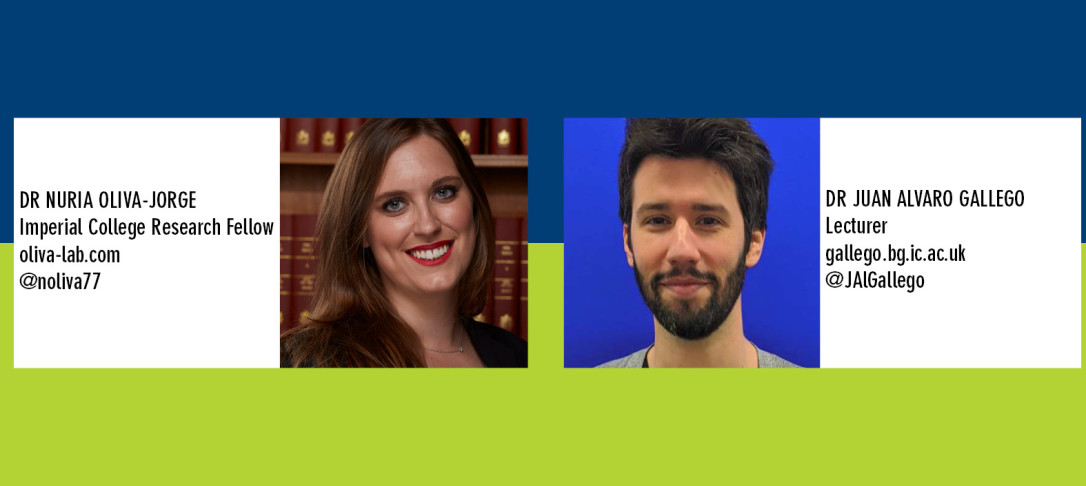
Catch up on this Bioengineering Department Seminar on our YouTube channel: Click here to watch
DR NURIA OLIVA JORGE
Talk title: Hacking wound dressings to deliver gene nanotherapy to skin
Abstract: Chronic wounds, due to impaired skin healing, affect between 2 and 6% of the total population in most developed countries. Current treatments involving antibiotic dressings and mechanical debridement are often ineffective and can eventually result in limb amputation. Alternatively, modulation of gene expression involved in the healing process promises an attractive therapeutic approach. However, protecting the genetic cargo from degradation, promoting efficient transfection into primary cells and enabling sustained release remain significant challenges in the push to clinical translation. My group has developed a hydrogel-based wound dressing that delivers poly(β-amino ester)s (pBAE) polyplexes loaded with mRNA in a sustained manner over time, showing high transfection levels and low toxicity in human dermal fibroblasts (HDFs).
Speaker biography:
 Dr. Nuria Oliva-Jorge is currently an Imperial College Research Fellow in the Department of Bioengineering at Imperial College London. An organic chemist by training, Nuria earned her PhD in 2016 from the Harvard-MIT Division of Healthy Sciences and Technology working on bioadhesives for wound closure and delivery of nanotechnology. She then became a postdoctoral fellow in Brigham and Women’s Hospital (Harvard Medical School) before crossing the pond after being awarded a Marie Sklodowska-Curie Action Postdoctoral Fellowship to conduct collaborative research between Imperial College London and Institut Quimic de Sarria (Barcelona). Her research group is focused on engineering smart bio- and nanomaterials to tackle human disease and ageing.
Dr. Nuria Oliva-Jorge is currently an Imperial College Research Fellow in the Department of Bioengineering at Imperial College London. An organic chemist by training, Nuria earned her PhD in 2016 from the Harvard-MIT Division of Healthy Sciences and Technology working on bioadhesives for wound closure and delivery of nanotechnology. She then became a postdoctoral fellow in Brigham and Women’s Hospital (Harvard Medical School) before crossing the pond after being awarded a Marie Sklodowska-Curie Action Postdoctoral Fellowship to conduct collaborative research between Imperial College London and Institut Quimic de Sarria (Barcelona). Her research group is focused on engineering smart bio- and nanomaterials to tackle human disease and ageing.
DR JUAN ÁLVARO GALLEGO
Talk title: Understanding behaviour through the collective activity of neural populations
Abstract: Neuroscientists try to understand the brain by recording the activity of neurons as subjects perform behavioural tasks. The analysis of neural population activity across several brain regions consistently uncovers low-dimensional “subspaces” that capture a large fraction of neural variability. These subspaces or “neural manifolds” are defined by the dominant patterns of covariation –shared activity– across neurons. I will discuss our approach to understand how the brain controls behaviour by focusing on these collective patterns of neural activity rather than on the traditional approach of studying the activity of single neurons.
I will focus on how animals perform the same behaviour on different days, showing that the collective activity patterns in the neural manifold remain preserved over years. I will complement these experimental findings with simulations that help us understand how low dimensional neural manifolds emerge, and why they may have the properties we observe in animal brains.
Speaker biography:
 Juan A Gallego is a Lecturer and research group leader in the Department of Bioengineering at Imperial College London, which he joined in January 2020. Before that, he was a Postdoctoral fellow in the Spanish National Research Council (CSIC) and Northwestern University, after being awarded a PhD from CSIC and University Carlos III in 2013. Dr Gallego’s research focuses in understanding how animals learn and control their movements based on a combination of behavioural experiments, large-scale neural recordings, data analysis methods, and computational models. During his career, he has published twenty-five journal papers, and contributed to over fifty conference articles.
Juan A Gallego is a Lecturer and research group leader in the Department of Bioengineering at Imperial College London, which he joined in January 2020. Before that, he was a Postdoctoral fellow in the Spanish National Research Council (CSIC) and Northwestern University, after being awarded a PhD from CSIC and University Carlos III in 2013. Dr Gallego’s research focuses in understanding how animals learn and control their movements based on a combination of behavioural experiments, large-scale neural recordings, data analysis methods, and computational models. During his career, he has published twenty-five journal papers, and contributed to over fifty conference articles.


